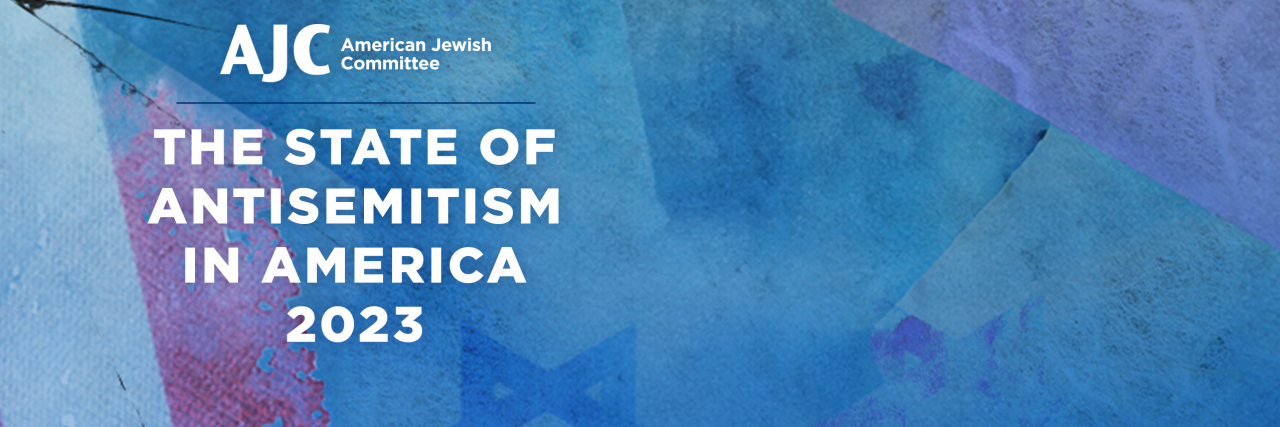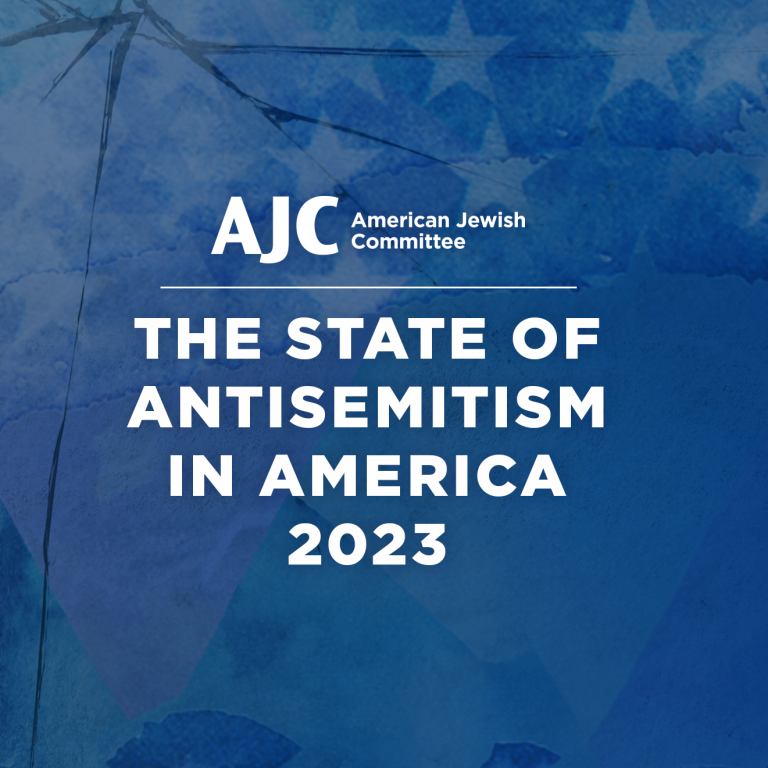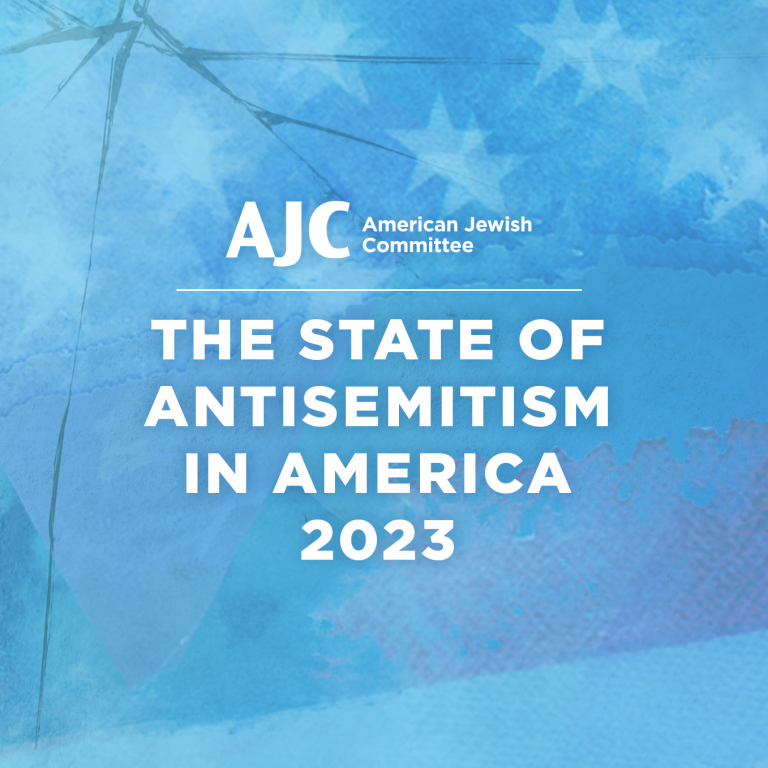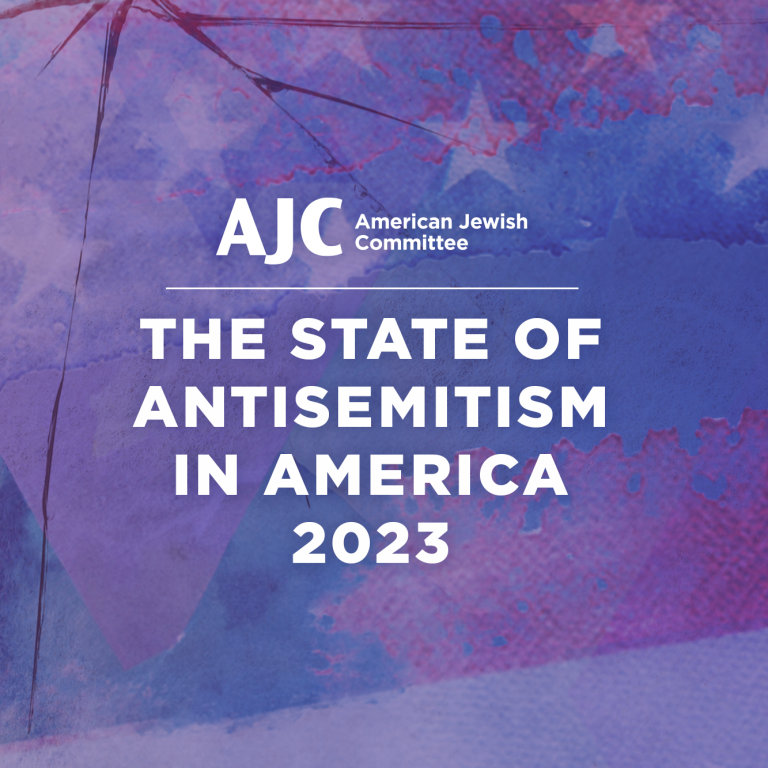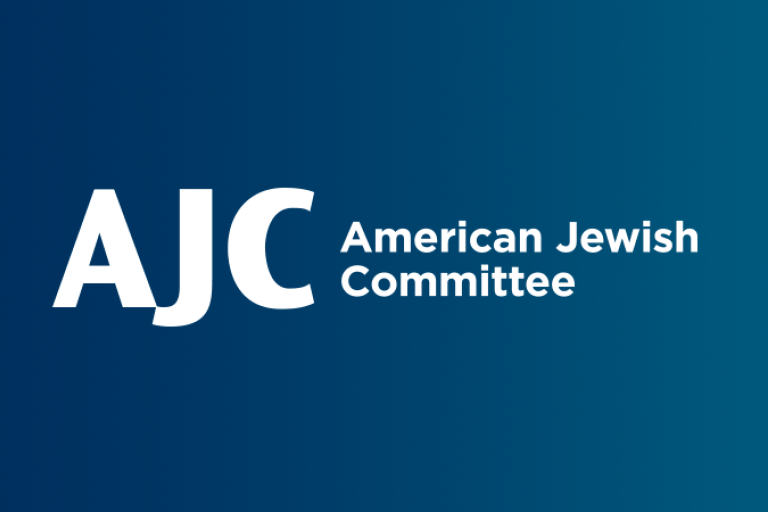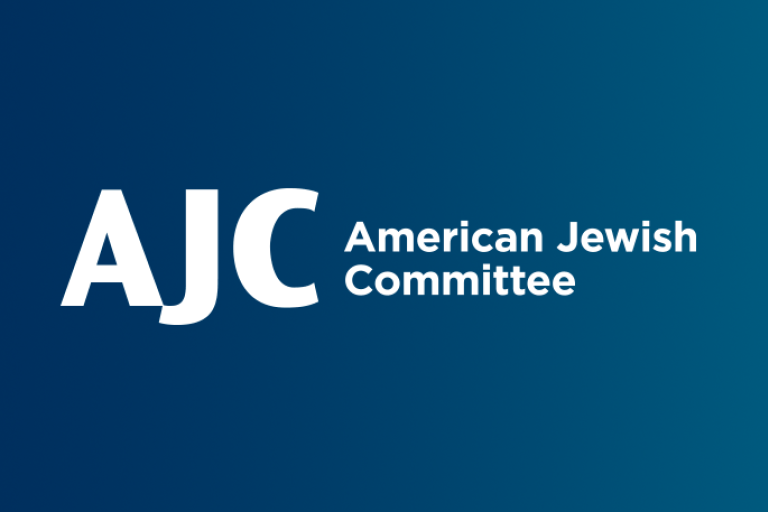February 13, 2024 — New York, NY
American Jewish Committee Survey Shows Effects of Rising Anti-Jewish Hate on Daily Lives of American Jews
Nearly half (46%) of American Jews changed their behavior out of fear of antisemitism in 2023, according to the American Jewish Committee (AJC) State of Antisemitism in America 2023 Report, released today. This is a significant increase compared to previous years (38% in 2022, and 39% in 2021).
The release of the data, from surveys done in the fall of 2023, comes four months after the Hamas terror attack on Israel on October 7 – the deadliest attack against Jews since the Holocaust – at a time when the global Jewish community is experiencing a dramatic surge in antisemitism. According to the survey, 78% of American Jews surveyed who had heard at least a little about the terrorist attacks in Israel by Hamas said it made them feel less safe as a Jewish person in the United States.
The first survey in the State of Antisemitism in America Report series, which focused solely on American Jews, was conducted in 2019 – one year after the attack at the Tree of Life Congregation in Pittsburgh, Pennsylvania. In 2020, AJC launched a parallel survey of the general U.S. adult population. The fifth annual report continues to assess and compare Jewish and general population perceptions of and experiences with antisemitism in the United States.
“With nearly half of American Jews reporting they changed their behavior in the past year because of fear of antisemitism, we need to take action – now,” said AJC CEO Ted Deutch. “AJC’s report also found that over the last year, 4 in 10 Jewish college students have felt the consequences of antisemitism, with one-in-five saying they have been excluded from a group or event because they are Jewish. This should alarm everyone especially with the dramatic increase of antisemitic activity on college campuses that has continued into 2024.
“AJC is calling on Congress and the White House to take decisive action to ensure the full implementation of the U.S. National Strategy to Counter Antisemitism across all sectors of society, including necessary legislation and appointing a national coordinator to continue the important work of addressing antisemitism in America. No one should be fearful of being targeted or harassed for being Jewish when walking down the street, going to school, or being at work. We’ve seen that antisemitism has been increasing – even before the horrific October 7 Hamas terrorist attack against Israel. This isn’t a new problem, but the explosion of antisemitism since October 7 demands that we take collective action now.
“That National Strategy lays out a whole-of-society approach to combating antisemitism – an approach that AJC has long advocated for here in the U.S. after seeing the progress made globally using this type of plan. Now that we have this road map, we need to be sure to use it. The strategy can no longer be seen as a recommendation, but rather a requirement that will help protect the American Jewish community,” Deutch added.
AJC’s State of Antisemitism in America 2023 Report provides unique insights by exploring how rising antisemitism is affecting the everyday lives of American Jews – in public, at school, and work – as well as how the general population perceives the threat of anti-Jewish hate over time.
The 2023 Report found that 4 in 10 U.S. adults (39%) reported personally seeing or hearing antisemitism in the past 12 months. Almost three-quarters of the general population (74%) say antisemitism is a problem (very serious or somewhat serious) in the United States today, with more than half (56%) saying it has increased over the past five years. Notably, the share of Jewish adults who say it has increased a lot reveals a dramatic spike over time: 50% in 2023, 43% in 2022, and 37% in 2021.
Sense of Safety and Security
More than 6 in 10 (63%) Jewish adults say the status of Jews in the United States is “less secure than a year ago”– more than a 20 percentage point increase in just one year (and a 30 percentage point increase over two years). For nearly 8 in 10 American Jews (78%) who heard about the Hamas terrorist attack in Israel, the attacks made them feel less safe as a Jewish person in the U.S.
One respondent recalled, “I was at an outdoor vigil mourning the murdered Israelis and three separate times, people drove past yelling out their car window ‘Kill them all’ among other things.”
AJC’s data also shows that 36% of young American Jews (between 18 and 29) reported being the personal target of antisemitism last year (compared to 22% over age 30).
Changing Behaviors
Almost half of American Jews (46%) have changed their behavior in at least one of three ways out of fear of antisemitism – a significant 8 percentage point jump in one year (reflecting a 21% increase). Three in ten (30%) say they have avoided posting content online that would identify them as Jew or reveal their views on Jewish issues and 26% each said the same about publicly wearing or displaying things that might identify them as a Jew, or avoiding certain places, events or situations out of concern for their safety or comfort as a Jewish person.
Antisemitism in the Workplace
Antisemitism is also affecting American Jews in the workplace. For Jewish adults who are employed full-time or part-time, and not self-employed, three in ten (30%) say they have avoided or experienced at least one of these issues in the workplace this past year: 24% have avoided expressing their views on Israel because of fears of antisemitism, 15% have avoided wearing or displaying something that would identify them as Jewish because of fears of antisemitism, 13% have felt uncomfortable or unsafe because of their Jewish identity, and 6% reported being told they could not take time off work for the Jewish holidays.
One respondent said, “I usually hear [antisemitic] remarks when I am at work from customers at our store.”
Notably, one in five (19%) American Jews reported local businesses where they live have been the target of antisemitism in the past five years.
Recognizing a need to support these businesses, last July, AJC signed a Strategic Alliance Memorandum (SAM) with the Small Business Administration (SBA) to help small business owners recognize, respond to, and help prevent antisemitism and other forms of hate. AJC is also partnering with the SBA as they implement action items outlined in the U.S. National Strategy to Counter Antisemitism.
Campus Antisemitism
Antisemitism on university and college campuses has been widely reported, especially following the October 7 Hamas terrorist attack, after which there were protests in support of Hamas across college campuses in the United States.
For current or recent Jewish college students, more than 4 in 10 (44%) have felt everyday consequences of antisemitism, as reported by current or recent college students or parents of this group, in at least one of the following ways: a full quarter (25%) say they have avoided wearing, carrying, or displaying things that would identify them as Jewish out of fear of antisemitism, 24% say they have felt uncomfortable or unsafe at a campus event due to being Jewish, 26% reported they avoided expressing views on Israel on campus or with classmates out of fear of antisemitism, and 25% say they were told they could not miss class for the Jewish holidays.
Additionally, 20% reported they felt or were excluded from a group or event because they are Jewish— an 8 percentage point jump in just one year from 12% in 2022 (reflecting a 66% increase).
Antisemitism Online and on Social Media
Online and on social media continue to be the place where American Jews report experiencing antisemitism the most, with 62% reporting seeing or hearing antisemitism online or on social media in the past 12 months. Critically, more than one in five American Jews who experienced antisemitism online (22%) reported that the online incident(s) made them feel physically threatened.
When asked why they felt the status of Jews in the U.S. is less secure than a year ago, one respondent pointed to social media, saying, “Social media and other platforms have given more visibility to antisemitism; hate crimes seem to be occurring at a greater pace; it is easier for hate groups to form online…”
For the first time, AJC asked American Jews their concerns about generative artificial intelligence (AI). Seventy-two percent of American Jews are concerned (very or somewhat) that generative artificial intelligence or automated systems, such as ChatGPT, will spread misinformation about Jews, and 62% of American Jews expressed concern that generative AI will show bias against Israel.
A Path Forward
While the 2023 Report reveals a stark picture of antisemitism as a longstanding, serious problem in the United States – and a problem that has increased since the October 7 attacks – there is also evidence to suggest widespread community commitment to combating the problem and ways to move forward. More than 9 in 10 Americans (both Jews and U.S. adults) believe “Antisemitism affects society as a whole; everyone is responsible for combating it.”
In addition to affirming this societal responsibility, the majority of Americans also value increased cooperation with each other. Nine in 10 Americans (both Jews and U.S. adults) say it is important for Jewish communities and other religious and ethnic communities to increase cooperation.
AJC’s Survey of American Jews soft launched on October 5, 2023, with the goal of fully launching the following week; however, fieldwork was paused following the October 7 Hamas terrorist attacks in Israel. In response to those events, the questionnaire was adjusted to add survey items to measure awareness of the terrorist attacks and the impact of those attacks on feelings of safety in the United States. The revised survey fully launched on October 17. Subsequent results reflect American Jewish and general population opinion in the weeks following the October 7 attack.
The surveys of American Jews and U.S. adults were conducted for the nonpartisan American Jewish Committee by the independent research firm SSRS. The Jewish American survey collected data from a nationally representative sample of 1,528 Jews, ages 18 or older from October 5 - November 21, 2023 (with 1,412 respondents interviewed after October 7). Most respondents participated via a self-administered web survey and the remainder were interviewed on the phone. The U.S. adult survey collected data from a nationally representative sample of 1,223 general population adults, 18 or older, from October 17 - October 24, 2023, via the SSRS Opinion Panel. The margin of error for Jewish respondents is +/-3.2 percentage points and for total U.S. adult respondents is +/-3.9 percentage points at the 95% confidence level.
AJC is the global advocacy organization for the Jewish people. With headquarters in New York, 25 offices across the United States, 14 overseas posts, as well as partnerships with 38 Jewish community organizations worldwide, AJC’s mission is to enhance the well-being of the Jewish people and Israel and to advance human rights and democratic values in the United States and around the world. For more, please visit www.ajc.org
###
